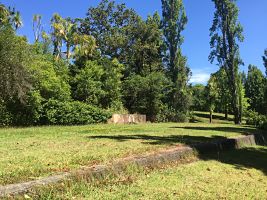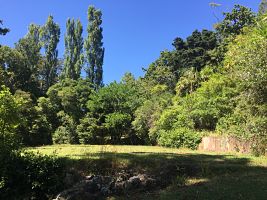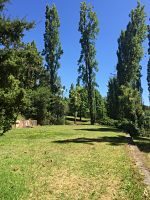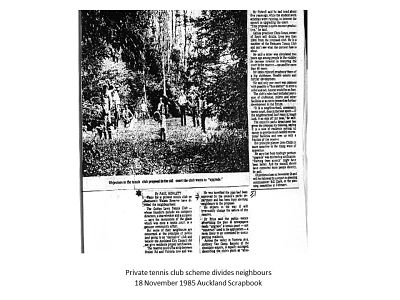Tennis Court on Waiata Reserve — 1985
18 November 1985,
Private tennis club scheme divides neighbours.
Plans for a private tennis club on Remuera’s Waiata Reserve have divided the neighbourhood. The Gables Lawn Tennis Club – whose founders include six company directors, a sharebroker and a surgeon, says the restoration of the glade which was a once a tennis court is a genuine community effort. But some of the neighbours are concerned at the principle of public land going to an “exclusive” club and believe the Auckland City Council did not give residents proper notification. The reserve is a 6.47ha strip between Orakei Rd and Victoria Ave and was once part of the Whitney and Nathan estates. It is mainly made up of gullies except for the flat area that used to be the estate tennis court. Now overgrown with several big trees, locals say the place is popular for picnics because it is flat and sheltered. The reserve is zoned Recreation B – passive activities only – so permission to build a sports club requires the council granting a specified departure from the district scheme.
Orakei Rd resident Hendrik Prins was one of only nine residents to be notified directly by the council’s planners. At least 100 houses back onto the reserve. He was horrified the plan had been approved by the council’s parks department and has been busy alerting neighbours to the proposal. He objects to the way it will irrevocably change the nature of the reserve. Dr Prins said the public notice advertising the plan in newspapers reads “upgrade” a tennis court – not “construct” used the in the application – a term likely go unnoticed by unsuspecting residents. Across the valley in Victoria Avenue, Anthony Van Camp, founder of the chocolate empire, is equally outraged, describing the club’s plans as “absolutely terrible”. He plans to formally oppose the proposal and is angry the council didn’t notify him. “It is a most underhand thing”, he said.
The closest house to the area in question is the principal’s residence for New Zealand’s Baptist Theological College in Victoria Ave – but neither the college or any staff and students in the 13 houses near the reserve were notified. Vice Principal Rev Harold Pidwell said the college would object through its solicitors and staff and students would privately object as residents. Mr Pidwell said they opposed having public land allocated to an ‘elitist’ group. The club’s rules complied with the council requirement for public use of the facilities but ensured founding members kept complete control. Mr Pidwell said he had tried about five years ago, while the student work schemes were running, to interest the council in upgrading the court. “This proposal is quite counter-productive”, he said.
Gables president Chris Innes, owner of Sport soft drinks, lives less than 100m from the proposed club. He is a member of the Remuera Tennis Club and can’t see what the current fuss is about. He said a letter was circulated two years ago among people in the vicinity to canvas interest in restoring the court in the reserve – unused for more than 40 years. Mr Innes rejected residents’ fears of a big clubhouse, floodlit courts and further developments. He said only one court was planned “with possibly a ‘bus shelter’ to store a roller and net. Access would be on foot. The club’s rules had included provision of a clubhouse, toilets and other facilities so as not to jeopardise further development in the future. “It is a neighbourhood community tennis court, done in the best spirit – if the neighbourhood doesn’t want it, tough luck, it’s no skin off my nose”, he said.
The council’s parks department has given the proposal its blessing, saying it is a case of residents putting up money to provide much needed recreational facilities and uses up only a fraction of the reserve. But principal planner John Childs is more sensitive to the rising wave of opposition. He says that from hindsight perhaps ‘upgrade’ was misleading notification. “Starting from scratch” might have been better. And the council should have contacted more people directly, he said. Objections close on November 26 and will be followed by a report to planning commissioner Bill Clark, or the planning committee in February.
Published 2017




